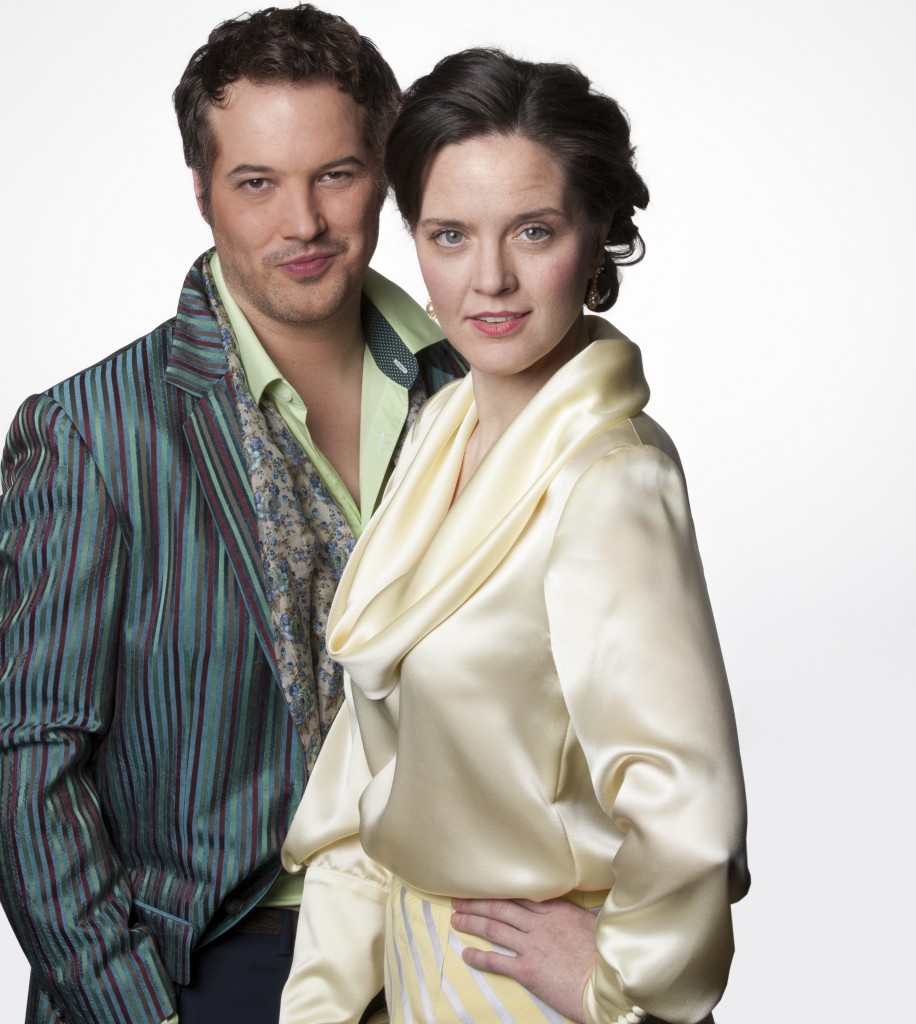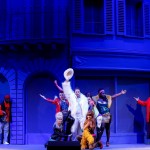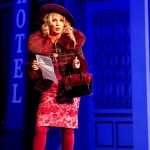 Jacques Offenbach, considered the creator of operetta, satirised the pomp of mid-19th century French society (Second Empire.) In Pariser Leben (La Vie parisienne) Swedish Baron Gondermark and his wife are victims of a scam: the womanising Gardefeu seduces his wife, while Metalla, a hooker, (and Gardefeu’s ex), distracts the randy Baron. How does this translate into a modern dress production? And French libretto (Meilhac and Halevy) into German? (Vienna has a great Offenbach tradition; many definitive versions of his operettas originated here.)
Jacques Offenbach, considered the creator of operetta, satirised the pomp of mid-19th century French society (Second Empire.) In Pariser Leben (La Vie parisienne) Swedish Baron Gondermark and his wife are victims of a scam: the womanising Gardefeu seduces his wife, while Metalla, a hooker, (and Gardefeu’s ex), distracts the randy Baron. How does this translate into a modern dress production? And French libretto (Meilhac and Halevy) into German? (Vienna has a great Offenbach tradition; many definitive versions of his operettas originated here.)
Offenbach showed a contemporary Paris for tourists, in a holiday mood, a Paris divorced from reality. So Volksoper’s (director/designer Michiel Dijkema) modern Paris has souvenir sellers, and street scenes showing the underbelly of Paris, an alternative Paris with streetwalkers, transvestites. It’s cutting edge, but we were expecting large sets, and glamorous revues. Where’s the Parisian elegance ?
Volksoper’s near-empty stage shows a sign for GARE DU NORD, and a stadium section jammed with tourists. How easy it is to travel around Europe, sing the chorus, rather half-heartedly. Sorry, the German dialogue- Achtung Gleich sieben over the intercom – doesn’t help, somewhat lacking in charm. Metella (Annely Peebo), an ‘Escort-Dame’, with a client, doesn’t recognise her former lovers Gardefeu (Daniel Prohaska) and Bobinet (Rasmus Borkowski) . Does she know them: she can’t decide. Nope, she doesn’t know them. Peebo’s Metella looks really tacky in a pink velour skirt, short check jacket, and ridiculously large hat.
In their duet, Bobinet and Gardefeu, in modern outfits, lime jacket , terracotta pants, (Prohaska) grey pants and blazer, sing, From now on we follow new rules of play, we’re looking for a woman of style today.
The supporters’ terrace of holidaymakers reappears: they disembark. The Swedes at least , (the Gondermarks), are elegantly dressed , Baroness (Birgid Steinberger) in a cream coat, Baron (Morten Frank Larsen) in brown overcoat. Gardefeu swops with the tour guide for his red blazer and cap- the Gondermarks ‘sold’ to him in a deal. As he claims his fee, asks what would they like: just between ourselves, no taboos. ‘Paris is open to us. So much lies in store’, they sing (with some irony.) Is the Grand Hotel in a good area?
The modern facades show a run-down district. A Brazilian tourist (Boris Pfeifer) in a white fur coat and hat makes out with the girls- very outré outfits- a parody of streetwalkers. (Sorry Pfeifer, weak-voiced, isn’t up to it.) 
The ‘Paris’ ensemble, ‘All countries and creeds ‘ sounds like a promotion for multiculturalism. ‘Foreigners gather from all over the world looking for fortune,’ they sing. Not bad , the staging , the tourists divided into two groups, each side of Prohaska. But generally, it’s underwhelming, drab, lacking in pizzazz.
Incongruously, the Grand Hotel sign is suspended on the side of the boot shop. The ‘hotel’s always overbooked’ explains Gardefeu, so he’s bringing them to his private apartment, ‘the VIP wing of the Grand Hotel’. The Baron has a letter of recommendation for a ‘Metella’; he’s only a short time in Paris, can hardly wait. Morten Larsen’s bass is, at times, a little strained. (The Baron insists on a table d’hôte. So Gardefeu has to arrange guests to pose as members of fine society.)
Gardefeu, in an aria, confesses he’s in love with the Baroness. Prohaska is very acceptable, but this wonderful aria needs a real star. The Baroness has found a ring, Metella’s. Metella arrives, Peebo a peroxide blond in low-cut top, flimsy long skirt, the hat too much. But mezzo Peebo is impressive, in terrific voice. Especially when, reading the Baron’s letter of recommendation – he’s hoping for what she offered his friend- promises to give her reply ‘in two days.’
When the so-called ‘table d’hôte’ guests arrive, the outfits are so exaggerated, like drag artists, they could be out of an early Pedro Almodavar movie. On the menu are pizzas and ‘spritzers’. And this lot are drinking beer. So far no advert for Paris. However, a small van circles the stage advertising ‘Théâtre sur la Seine, Le nouvel Opéra’ -and with a French-speaking driver-the first authentic taste of Paris. The street vendors send up the nobility. Chorus sing Offenbach’s lambast on their intent to impersonate fine ladies, their manners only a veneer, false social hypocrisy. Rather well sung, but the setting is tawdry. Cecie ne pas Rue Covette ‘ as it says on the barely-visible poster.
The Baron in a duet with the ridiculously dressed platinum-blonde Pauline (Julia Koci)- purple midriff, flowing skirt, boobs protruding- barely keeps up with her. They sing ‘Love makes you feel like you’re floating on a cloud.’ At the party, the impossibly complex scheming is to keep the Baron occupied while Gardefeu seduces his wife.
In Offenbach’s plot, ‘the champagne flows freely’ (the Baron provides them with wonderful wine). But in this travesty, the guests are drinking beer out of bottles (?!) when the Baron goes off to enjoy Parisian night life. There’s one good moment: the mannequins walk out of a shop window (Maison du bon goût). But the bottle-swigging is crude and vulgar: out of keeping with the operetta- whatever the time period.
But, at last, (ending first half) there’s a glitzy black and white spectacular, featuring Vienna State Ballet: a pyramid of style. The dancers front of stage, guys in black one-piece cat suits, the girls in silver striptease, ermine pompons, white feather plumes. Then the boys, slickly choreographed, fall about fighting. On the staircase, men in black deejays and top hats, women in cloaks.
Then, the finale , the CANCAN, la piece de resistance: the dancing girls in their extravagantly plumed headpieces, skimpy bikinis, kicking those leggggs. The saving grace so far.
In the second Part (Act 4) we see the Baroness’ bedroom, with Gardefeu as if pouncing on her. Outside a poster for a Cancan Revue; beneath, over-spilled dustbins and people sleeping on the street. (What did they drink, they carouse.)
Steinberger’s cool, blonde Baroness sings, yesterday she was a tourist. Now she’s deeply moved by sweet dreams; gives herself over to her man. She’s sensed this handsome stranger. (He sings he’s not sure of love.) She’s no good as a mistress, she admits, but she’s in love. Prohaska is a pleasing tenor, but outclassed by the superb Steinberger. She swoops up to, sustains, her high notes confidently; but also warm and affecting.
But once she learns of the trick played on her, the Baroness determines on revenge, assisted by her visiting aunt (redoubtable actress Helga Papouschek) who, disguised as her niece, shares Gardefeu’s bed.
 Metella eventually rejects the Baron’s advances , bored with her ‘professional life’. No longer the woman she was, she seeks a new life to be shared with only one man, Gardefeu. In a powerful aria , (perhaps Offenbach’s private agenda), Peebo sings movingly, Paris by night is an illusion. They’re all seeking their fortune. Yes, Paris by night is a machine- pleasure without scruples. This town’s a wild party that never ends. And, most condemnatory, Paris injects poison into our veins. …So we won’t have a night of fun, remarks the Baron.
Metella eventually rejects the Baron’s advances , bored with her ‘professional life’. No longer the woman she was, she seeks a new life to be shared with only one man, Gardefeu. In a powerful aria , (perhaps Offenbach’s private agenda), Peebo sings movingly, Paris by night is an illusion. They’re all seeking their fortune. Yes, Paris by night is a machine- pleasure without scruples. This town’s a wild party that never ends. And, most condemnatory, Paris injects poison into our veins. …So we won’t have a night of fun, remarks the Baron.
All the dancers are now under a red light. The Brazilian and Gabrielle (the erstwhile prostitute), now engaged , raise their glasses to Paris, a lover’s paradise. (But we know otherwise.) So ‘that’s why the champagne flows’, in Offenbach’s number. The orchestra reprise the Cancan refrain, as the Swedish couple sit forlorn (at the Gare du Nord) awaiting their train.
Volksoper orchestra conducted by Sébastian Rouland was on excellent form. The problem was with Michiel Dijkema’s vulgar staging . The cast was generally good, some Steinberger and Peebo , especially . I can’t complain about the German version. Vienna Volksoper, home of operetta, is dedicated to making opera accessible to a German-speaking public. But I’d love to hear it in French! P.R. 18.09.2015 ©
Photos: Daniel Prohaska (Gardefeu) and Caroline Melzer (Baroness Gondermark ) ; Boris Pfeifer (the Brazilian) and Volksoper ensemble; Annely Peebo (Metella)
© Barbara Pállfy/ Volksoper Wien
viennaoperareview.com
Vienna's English opera blog
